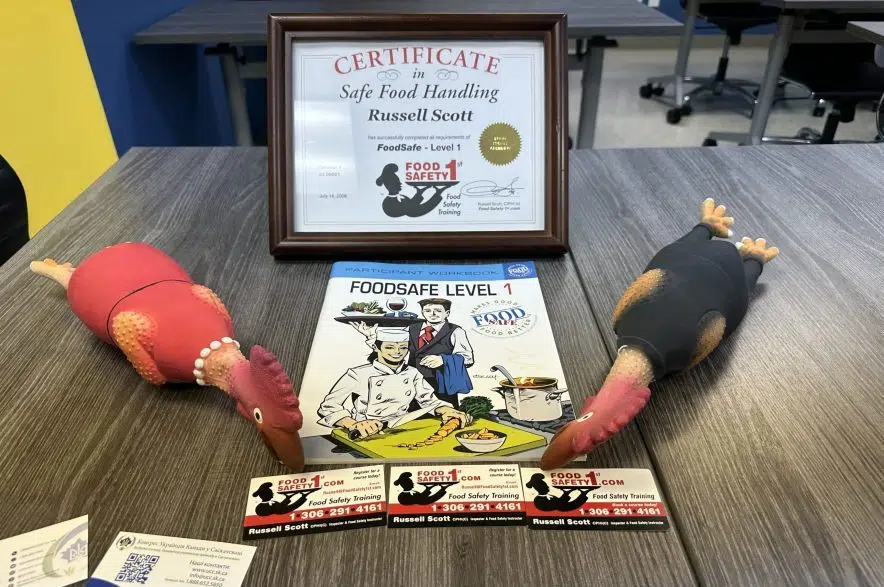When Russell Scott decided to donate his time, energy and expertise in food safety to help Ukrainians fleeing the war in Saskatchewan more than a year ago, he could have never envisioned the response he received.
Scott — who owns, operates and teaches courses through Food Safety First — has been teaching students how to handle and prepare food safely since being certified in 1986. After the war in Ukraine began, the self-described “chief cook and bottle washer” said he knew he needed to step up to help.
For Ukrainians displaced by the war and new to Canada, Scott has been offering his course free of charge, requesting only that the $17 course material be purchased. For that, however, he has obtained a long list of sponsors to help support newcomers wishing to learn about food safety.
“I feel for those people. I couldn’t imagine living here in Canada and being invaded and having to leave my home and our family being split apart,” Scott shared.
The certificate his students obtain when they pass the final exam with a 70 per cent grade or higher is recognized throughout Saskatchewan and Canada, Scott said, with jobs in many provinces requiring at least one person per shift at places where food is prepared to have the designation.
It opens up opportunities for work at places like restaurants, food trucks, delis, hospitals and group home kitchens — wherever food is prepared.
Scott started the process more than a year ago by getting the final food safety exam translated into Ukrainian. His first Ukrainian student graduated in July 2022. Today, he’s passed 50 in total — and those students aren’t limited to Saskatoon or Saskatchewan.
The food handling instructor has been teaching students in classes in person at Saskatchewan Polytechnic as well as through online courses, allowing him to teach students from as far away as Nanaimo, B.C. and Hamilton, Ont.
“They have all passed, many of them with flying colours,” Scott said.
He said his students are smart, willing and eager to work — especially having left highly educated positions in Ukraine and seeking work to pay for their families.
Danylo Puderak, executive director of the Ukrainian Canadian Congress (UCC) of Saskatchewan, said many Ukrainians arriving in Canada are also trying to send money back home to family still in Ukraine.
“Perhaps their English isn’t so strong but they’re coming and they need to find those survival jobs,” Puderak said.
He said the people and businesses in Saskatchewan have been welcoming and open to helping displaced Ukrainians arriving — which has been important, Puderak said, with so many who have arrived and are still coming.
The hospitality industry, where students Scott graduates are able to find work, has been a go-to place for many Ukrainians new to Canada, Puderak said.
“Having an opportunity like this … has been very beneficial to them being able to transition and have that course and the exam, in particular, available to them in their first language,” Puderak said.
That’s why Scott’s next goal is seeing the book for the food safety course also translated into Ukrainian. The book has been translated into numerous other languages — including Mandarin and Arabic — as have other information booklets like driver’s manuals, according to Puderak.
“We’re not there to test their knowledge of English, we’re there to test their knowledge of the rules of the road, or in this case, their knowledge of safe food handling,” Puderak stated.
Scott can only laugh when asked about his current schedule.
“It’s absolutely crazy,” Scott said, still chuckling.
Now, Scott is still looking to expand by delving into a partnership to offer classes at the UCC as well.
This most-recent milestone is just an indicator to Scott of how many more people he could teach about food safety.
“I’m excited because I see the emails coming in from people saying thank you,” Scott said with emotion in his voice.
One of his former students told Scott his course was a “gift.”
Several have emailed Scott to let him know they now have jobs in supermarket bakeries, meat and deli stores, at ski resorts and as restaurant servers.
“I’m very flattered by some of the wording some of them have used,” Scott said. “I find it hard just to talk about because it’s overwhelming for me, it really is.”







